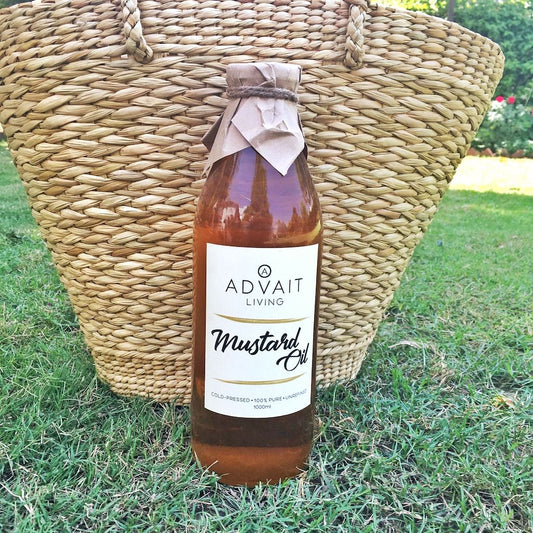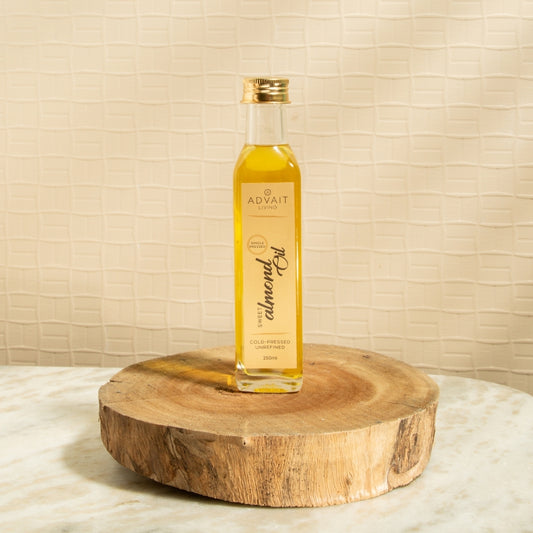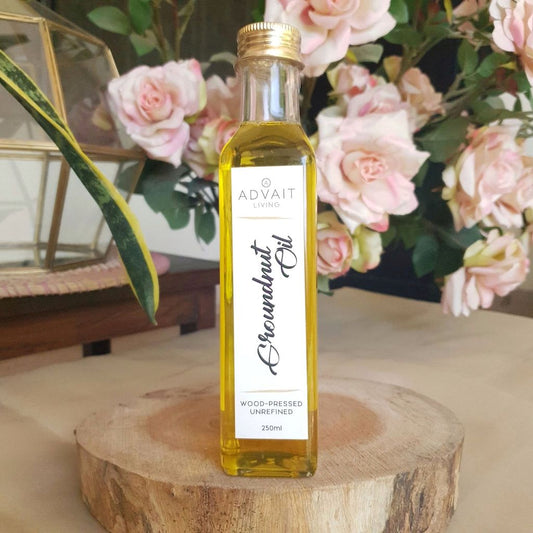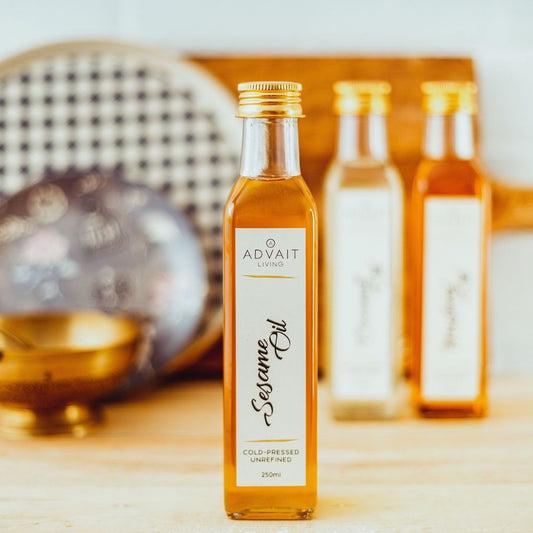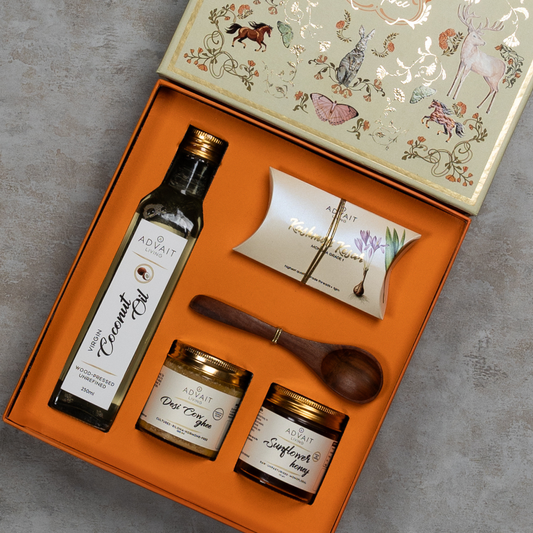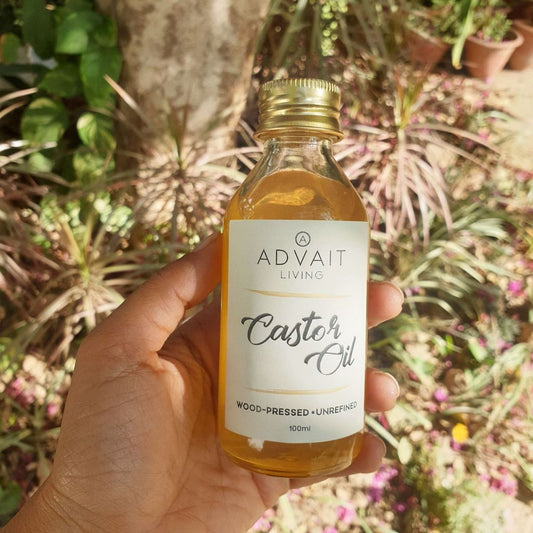Mustard oil or ‘sarso ka tel’ has been a staple in India since ancient times. Its sharp, pungent smell, distinct flavour and golden hue have a very special place in Indian culinary traditions, especially in regions like Bengal, Punjab, Uttar Pradesh and Rajasthan, where it is commonly used for daily cooking. It also finds itself mentioned in Charak Samhita and Atharva Veda. Ayurveda highly recommends mustard oil for its various benefits and gives several remedies with mustard oil as a base.
Packed with nourishing essential fatty acids and bioactive compounds, this unique flavoursome and versatile oil will once again cement your trust and confidence in India’s ancient science and wisdom.
Here are several science-backed health benefits that make kachi ghani mustard oil (traditional cold pressed mustard oil) an outstanding oil to include in your health routines and daily cooking.
Mustard - Ayurvedic Wisdom
Mustard has a really long history in ancient India, dating back thousands of years. It has found mention in ancient texts such as the ‘Atharva Veda’ that mentions it more than once and suggests an even older past. Even the earliest archaeological evidence of mustard seeds in the Indian subcontinent comes from the excavations at the ancient sites of Harappa and Mohenjo-Daro, which were part of the Indus Valley Civilization dating back to around 3300–1300 BCE.
However, over the centuries, mustard has been firmly established in Ayurvedic practices and holds a significant medicinal value for its therapeutic properties. Known variously as sarṣapa, siddhārthaka, rājikā and āsurī, mustard is well documented in classical Ayurvedic literature like Caraka Saṃhitā, Suśruta Saṃhitā, Bhela Saṃhitā and Kāśyapa Saṃhitā. It is also mentioned in the group of edible oils ‘Taila Varga’ as part of Chark Samhita, Sushruta Samhita, and Ashtanga Hridaya in Ayurveda, which mention that mustard oil is ‘katu’ (pungent in taste), ‘ushna’ (hot in potency) and ‘laghu’ (easy to digest). It has been used both for cooking and for medicinal purposes.
Mustard oil is recommended as a cooking oil and can be consumed orally. As per Ayurvedic texts, it improves digestion, has a scraping action and is useful in the management of diseases caused by Kapha, build-up of fat, derangement of Vāta, haemorrhoids, diabetes, diseases of the ear and head, itching, eruptions, intestinal worms, vitiligo and chronic diseases. It is also recommended for diabetes, skin diseases, frozen thigh, elephantiasis and retention of placenta.
Ayurveda has mentioned several external uses of mustard oil and its application as a therapeutic oil. It appears in many formulations for treating skin diseases, abdominal swelling, epilepsy and insanity. It is considered to be a lipid-lowering agent, anthelmintic, and used in the treatment of diseases affecting the head, haemorrhoids and wounds. When mixed with garlic and turmeric, this oil alleviates the symptoms of rheumatism and arthritis. It can also be used as a mosquito repellent by applying a few drops on the skin.
How is Cold Pressed Mustard Oil Extracted?
Mustard is primarily a Rabi crop in India, with the country being one of the leading producers of mustard seeds globally. India grows several varieties of mustard, including yellow mustard (Brassica juncea) and black mustard (Brassica nigra). Both Black and Yellow mustards are known for their high oil content and adaptability to different agro-climatic conditions.
Mustard seeds are one of the primary oilseeds used to extract edible cooking oil, also commonly called ‘Sarson ka tel’ in Hindi and ‘Kadugu Ennei’ in Tamil. Traditionally, mustard oil is extracted from the seeds using traditional cold pressing methods, using a traditional wooden ghani to obtain the best quality oil that involves the following parameters:
- Extraction Method: Cold pressed mustard oil is extracted from the highest quality mustard seeds through mechanical pressing in a traditional wooden ghani or stone chekku without the use of toxic heat or chemical solvents. The wooden press is rotated at low rpm without any application of additional heat.
- Single Press: Good quality mustard oil will be 'virgin', meaning that the oilseeds are ‘single-pressed’ (without the mustard oilcake being pressed a multitude of times), ensuring superior quality often graded as "Grade A" oil.
- Natural Sedimentation: After extraction, the oil is naturally settled for a few days before filtration and packaging in glass bottles, preserving its natural aroma and freshness.
- Nutrient-dense: Minimal heat application retains its original flavour and aroma. The cold pressed mustard oil extraction eliminates processes like solvent and refining, bleaching, and deodorizing thereby keeping intact the original nutritional richness, including essential fatty acids, phytonutrients, and antioxidants.
- No blending or addition of preservatives: Pure cold pressed mustard oil will be 100% from mustard seeds without mixing any additional oils or other mediums. It would be ideally free of additives or preservatives as well.
Cold pressed or kachi ghani sarson ka tel is usually characterised by a deep golden colour, mild to pleasant pungent odour and a distinctive flavour. The unique and more popular pungent odour of the mustard oil comes from ‘allyl isothiocyanate’ - a naturally occurring antimicrobial compound found in plants such as mustard.
Cold Pressed Mustard Oil Nutritional Facts
Cold pressed mustard oil is 99.87% fatty acids, and these determine its quality and stability. It consists of saturated fats (11.5%) such as palmitic acid & stearic acid, and is packed with healthy monounsaturated fats (60%) and polyunsaturated fats (28%). It contains oleic acid at 12% (omega-9), linoleic acid at 18% (omega-6) and linolenic acid at 11% (omega-3).
One of the most significant differences in mustard oil compared to other cooking oils is that, unlike other oils, cold pressed mustard oil has the ideal Omega6:Omega3 ratios of 2:1 (or lesser), making this oil one of the healthiest cooking oils. Zero cholesterol and trans-fats make it cardiovascular-friendly.
Besides fatty acids, cold pressed mustard oil is also known for the presence of natural antioxidants, vitamins A, C and E (tocopherol) and other nutrients:
- It is rich in protein, zinc and calcium and therefore is helpful in body and bone development.
- It is rich in dietary fibres and is useful for the digestive system.
- A sufficient number of calories, required for energy, are available, in addition to some quantity of selenium and magnesium.
- It contains Vitamin A and, therefore, is good for the eyes.
- The presence of Vitamin C and Vitamin E makes it useful for metabolic and antioxidative functions, respectively.
- It can also control acid-base balance in our body as it is a good source of potassium and sodium.
Why Do Indians Use Kachi Ghani Mustard Oil for Cooking?
In India, Kachi Ghani Mustard oil is primarily used for cooking and widely used in many states such as Jammu & Kashmir, Himachal Pradesh, Punjab, Haryana, Uttar Pradesh, Rajasthan, Madhya Pradesh, West Bengal, Bihar, Chhattisgarh, Jharkhand, and some regions of Maharashtra and Northeastern states. This is the most common edible oil used by Indian households, next to groundnut oil.
- Traditional Ancient Crop: Mustard cultivation is one of the oldest practices in Indian agriculture and can be traced through Indian history. It is one of the hardiest crops to grow and requires very little water, so in arid climates such as India’s northern belt, it is an easy and well-seasoned crop to grow that provides a good yield. In addition to this, mustard seeds are very easy to store and can be kept throughout the year without much damage, and this makes mustard seeds very attractive as a preferred crop, resulting in massive popularity over the years and has become a staple food in Indian households.
- Traditional Culinary Practice: Since cold pressed mustard oil has been used in Indian cooking for centuries, it has become an integral part of traditional culinary practices.
- Distinctive Aroma and Flavour: Mustard oil has a unique, pungent aroma and a sharp flavour that adds depth and complexity to dishes. Many regional dishes have been developed specifically with mustard oil to bring out distinctive flavour and taste profiles in dishes such as Bengali spicy fish curry, kathal ki masaledaar sabji (कटहल), UP ki sarson wali aloo matar, bihari chicken curry and lal mirch shikari mutton and many more.
- High Smoke Point: Mustard oil has a relatively high smoke point compared to other cooking oils, making it suitable for high-temperature cooking methods such as deep-frying, stir-frying, and sautéing. Even a study investigating the effects of deep frying concluded that mustard oil shows high oxidative stability compared to groundnut and soybean oil. Monounsaturated fatty acids and sulphur in this oil contribute to its higher oxidative stability, thus making it ideal for cooking.
- Preservative Properties: Mustard oil has natural antimicrobial properties due to compounds like allyl isothiocyanate, which inhibit the growth of bacteria and fungi. In traditional Indian cuisine, mustard oil is often used in pickling and preserving foods to extend their shelf life.
- Affordability: Mustard oil is one of the cheaper and more affordable cooking oils that are available, and hence it has mass appeal, making it a staple in most Indian households.
Moreover, traditional raw & unrefined mustard oil has also become a part of daily routines such as prayers and rituals, festivals and even self-care.
10 Science-backed Health Benefits of Cold Pressed Mustard Oil
Opting for cold pressed mustard oil for your kitchen should stem not only from its traditional use or its culturally rich legacy but also from its innumerable health benefits. Modern science is also understanding its rich nutritional profile and has started recommending it as part of ‘good fats’ in our diets.
Mustard oil is not just confined to cooking. This oil has a pivotal role in improving health conditions. Due to its unique composition, such as monounsaturated fats, antioxidants and anti-inflammatory compounds, this oil acts as a natural remedy for many ailments. From strengthening your body and protecting it from cancer to reducing diabetes hazards, this oil plays a vast role in improving our health conditions.
Here are 10 powerful and scientifically backed benefits of mustard oil.
1. Improves Food Safety
Food is often contaminated by the invasion of microbes, leading to several health complications. Several studies found that mustard oil has antimicrobial properties that prevent the invasion of microbes in the food. The allyl isothiocyanate contributes primarily to preventing fungal growth in the food and maintains food safety.
Evidence concludes that mustard oil is 10 times better at killing bacteria than cinnamon oil. This oil arrests the cell cycle of bacteria, prevents its further growth and eventually leads to death. Another research report states that mustard oil disrupts the bacterial cell wall and causes cell lysis. The essential oil from mustard has also been proven as one of the effective alternatives for synthetic preservatives.
2. Reduces Inflammation
One of the single most important differentiators for cold pressed mustard oil is its property to be an anti-inflammatory oil. Recent studies and research are pointing to ultra-processed vegetable oils (such as refined sunflower oil, refined soybean oil, refined corn oil, etc) as factors leading to obesity and poor cardiac health in the modern world. This is because most of these oils are highly inflammatory, with large PUFA components dominated by Omega 6 (linoleic acid).
On the other hand, cold pressed mustard oil has much lower Omega-6 as compared to most seed oils and a significantly higher amount of Omega-3, which also alleviates inflammation. Furthermore, cold pressed mustard oil contains a phytochemical compound - Allyl Isothiocyanate (AITC) - that has anti-inflammatory effects. Research shows that AITC, found in mustard oil, inhibits Th2 inflammation, markedly improves lung function and decreases cytokine secretion as well.
3. Promotes Better Heart Health
Cold Pressed Mustard Oil has high amounts of MUFA 60% (monounsaturated fatty acids) with the presence of high amounts of Omega 3 (11%) and the absence of trans fat & cholesterol. Several studies have shown that a diet rich in monounsaturated fatty acids is known to produce cardio-protective effects and even lower blood pressure. In addition, the presence of Omega 3 in mustard oil can reduce triglycerides in the blood and improve good HDL.
Furthermore, alpha-linolenic acid (omega-3 fatty acid) has anti-inflammatory properties and reduces the aggregation of blood platelets that cause heart failure. Glucosinolates (and their isothiocyanates), the bioactive phytochemicals found in Mustard oil, have been shown to improve cardiovascular functions with improved endothelial functions and reduced formation of plaque in the inner lining of an artery.
Moreover, the absence of trans-fatty acids promotes better cardiac health.
Trans fat is a type of unsaturated fat that increases harmful LDL cholesterol and reduces the beneficial HDL cholesterol. Research shows that high absorption of trans fat in children is the major cause of asthma and allergies. A good quality kachi ghani mustard oil has zero trans fat, and intake of such an oil can help protect the heart and lungs.
4. Powerhouse of Antioxidants
Glucosinolates, found in mustard oil, provide a powerhouse of antioxidant effects. It acts by induction of antioxidant and detoxifying enzymes (such as glutathione-S-transferases and UDP-glucuronosyl transferase) and by inhibition of carcinogen-activating enzymes in the body. Another antioxidant - Vitamin E, found abundantly in cold pressed mustard oil (34%), is known to rapidly transfer its phenolic hydrogen atom to neutralise free radicals in the body and thereby reduce oxidative stress.
5. Better than Olive Oil to Reduce Arthritis Pain
According to Ayurveda, Mustard oil has Kapha-balancing and Ushna (hot) properties. Massaging with mustard oil may provide relief from joint pain.
A study conducted on humans on the effectiveness of massages with mustard oil vs massages with olive oil on pain perception among people with arthritis found that the benefits of mustard oil massage were far greater than the olive oil massages.
Cold pressed mustard oil, when applied topically, reduced the painful effects of rheumatism and arthritis as perceived by the patients. This could be due to the presence of allyl isothiocyanate, which can also relieve pain analgesically, besides lowering inflammation in the body. Besides the presence of Omega 3 fatty acids, higher in mustard oil as compared to olive oil, has been shown to increase blood flow, lessen stiffness and swelling in the affected area, and ease muscle and joint discomfort.
6. Reduces the Risk of Cancer
Several studies show that glucosinolates (phytochemicals) and myrosinase, both metabolites found in mustard, produce isothiocyanate sulforaphane that has anticarcinogenic properties, which reduce the effects of cancer. Recent studies also indicate that sulforaphane targets the most cancer stem cells, which are not affected by conventional cancer treatments. Another study indicates that edible mustard oil is more effective than fish oil in preventing colon cancer in rats.
Several studies show that the absence of trans fat in dietary sources, such as mustard oil, reduces the risk of cancer and maintains normal body temperature in humans. The extracts of black mustard, such as ethanol and ethyl acetate, are known for their antiproliferative activities against cervical, liver, colorectal, and breast carcinoma cells. This extract also protects against DNA-induced damage.
7. Strengthens Cell Membranes and Red Blood Cells
The nutritional and metabolic process of the human body requires fat through dietary intake. As mustard oil is enriched with fatty acids such as omega-3, omega-6 and omega-9, among others, it plays a major role in the composition of plasma and cell membranes.
On the other hand, it also helps improve the structure of red blood cell membranes. Omega 3 is responsible for numerous cellular functions, such as signalling, cell membrane fluidity, and structural maintenance, and studies indicate that Omega 3 is directly associated with a healthy red blood cell distribution width.
8. Provides Nourishment to Skin and Hair
Cold pressed mustard oil is packed with nutrients such as essential fatty acids and minerals such as zinc, selenium, magnesium, calcium, potassium and Vitamins A, E and C. It is also an excellent source of antioxidants and active phytochemicals. The abundance of nutrients, along with a balanced diet, improves cell hydration, cell formation, immune function, etc. The skin and hair are a reflection of good internal health, and cold pressed mustard oil nourishes the skin and hair in multiple ways -
- Reduces dryness: According to Ayurveda, mustard oil has the property of snigdha (oily), which helps to reduce excessive dryness. Hence, applying or massaging with mustard oil can improve the texture of the skin, making it softer.
- Antifungal: Mustard oil is loaded with antifungal and antimicrobial properties. It fights off infectious bacteria, and when applied topically, it prevents and treats fungal & bacterial infections in the skin. It also helps prevent dandruff and scalp infections, leading to improved hair growth.
- Antioxidant: The active compounds of mustard oil, along with vitamin E, not only reduce oxidative stress but also prevent DNA damage, thereby improving your skin’s overall health, making it glow, reducing wrinkles, and preventing greying of hair.
- Improves Scalp Health: Essential fatty acids, along with vitamins and minerals, provide for a healthier scalp, and the reduced oxidative stress prevents greying of hair.
9. Acts as a Digestive Stimulant
Mustard oil stimulates digestion by triggering the production of bile and gastric juices from the liver and gallbladder. In addition to this, it promotes blood circulation, digestion, and excretion. The formation of different juices for the digestion of food depends on a healthy diet.
10. Reduces Diabetes Hazards
Cold Pressed Mustard Oil is far safer than refined cooking oils when it comes to diabetes hazards. Cold pressed mustard oil also has a strong anti-inflammatory property due to the presence of AITC (allyl isothiocyanate), which helps improve metabolic health and prevent diabetes in the first place. It also contains much less inflammatory-producing Omega-6 as compared to other refined oils and is rather packed with Omega-3, which are known to protect the body by reducing oxidative stress and improving metabolic syndrome, a precursor to diabetes.
This study shows that a diet rich in mustard oil increased insulin receptor signalling thereby reducing blood glucose levels, in experimentally induced diabetic rats. According to this study, a diet rich in monounsaturated fats (also found in mustard oil) can also help improve insulin sensitivity.
Furthermore, studies show that trans fat causes insulin failure and high-fat oxidation, and the absence of trans fat helps to control blood sugar levels and reduce the risk of diabetes hazards.
Conclusion
In conclusion, the journey through the ancient wisdom and modern scientific insights into cold pressed mustard oil reveals not just a culinary staple but a powerhouse of health benefits deeply ingrained in India's cultural and medicinal heritage.
From its roots in Ayurvedic texts to its application in contemporary research, mustard oil stands as a testament to the enduring wisdom of traditional practices. Its extraction through traditional methods preserves not only its nutritional richness but also its distinct aroma and flavour.
The science-backed health benefits of cold pressed mustard oil offer a compelling case for its inclusion in our daily lives. Whether it's enhancing food safety, reducing inflammation, promoting heart health, or combating cancer risks, mustard oil emerges as a versatile ally in our quest for well-being.
Moreover, its nourishing properties extend beyond the kitchen, providing skincare and haircare solutions rooted in natural goodness. As a digestive stimulant and a safeguard against diabetes hazards, its role in holistic health cannot be overstated.
As we embrace the treasure trove of benefits offered by cold pressed mustard oil, we not only honour our cultural heritage but also embrace a healthier future. Let mustard oil not just adorn our culinary creations but also enrich our lives with vitality and wellness, echoing the timeless wisdom of the past into the promising horizons of tomorrow.
Frequently Asked Questions
1. What is cold pressed mustard oil good for?
Cold pressed mustard oil is good for cooking, skincare, and haircare due to its high content of monounsaturated and polyunsaturated fats, along with antioxidants and anti-inflammatory properties.
2. Is Kachi Ghani and cold pressed mustard oil the same?
Kachi Ghani and cold pressed mustard oil are often used interchangeably, both referring to traditional methods of oil extraction without heat or chemicals. While not the same, they share similarities in being minimally processed and retaining the natural goodness of mustard seeds.
3. How do I identify if mustard oil is of good quality?
To identify good quality mustard oil, look for a clear, golden-yellow colour with a pungent aroma and a slightly sharp taste. Additionally, opt for oils labelled as cold pressed or Kachi Ghani, such as Advait's, as they retain more nutrients and flavour compared to refined oils. Checking for proper certifications and sourcing from trusted brands can also ensure quality.
4. Is Mustard Oil Good for Daily Use?
Yes, mustard oil is good for daily use. Enriched with fatty acids and other nutrients, this oil provides numerous health benefits such as protecting cardiovascular health, reducing diabetic hazards, reducing cancer risk, etc.
5. Can We Apply Mustard Oil to Our Faces?
Of course, you can apply mustard oil on your face to hydrate your skin and help with signs of ageing. As this oil is rich in vitamin E and omega-3 fatty acids, applying a few drops on your face and washing it off hydrates your skin.
6. Which Colour of Mustard Oil is Best?
Compared to other types of mustard oil, yellow mustard oil is best and has better taste and aroma than black mustard oil. This oil has a milder taste and maintains the original flavour of the food.
7. Who Should Not Eat Mustard Oil?
Mustard oil is not recommended for pregnant and breastfeeding women, infants, young children and individuals with heart disease. Before consuming this oil, it is advised to consult your physician for better results.




















